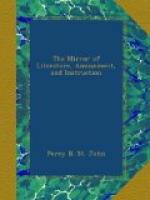Amongst other Heathen nations, before they prepared for any important enterprise, the whole expedition fasted. The Lacedemonians having agreed to aid an ally, ordained a fast throughout their nation, and without even excepting their domestic animals. The Romans having besieged the city of Tarentum, and the city being hard pressed, the citizens demanded succour of their friends, the inhabitants of Rhegium; who, preparatory to granting assistance to the besieged, commanded that a fast should be held throughout their territories. Their aid having proved successful, the government of Tarentum to commemorate this important event, ordained a perpetual fast on the day of their deliverance.
Philosophers and certain religious people have for ages reckoned fasting as a service which led to important results, and a duty which could not be dispensed with without causing the wrath of God to fall upon the heads of the nation. At Rome it was practised even by the emperors. Amongst the most remarkable for keeping this institution were Numa Pompilius, Julius Caesar, Vespasian, &c. Julian, the apostate, was so exact in the performance of this ordinance, that the fasting of the philosophers and of the priests themselves, was as nothing compared with his abstinence. Pythagoras fasted sometimes as long as forty days; his disciples followed the example of their master; and after his death they kept a continual fast, in which they denounced the inhabitants of the deep as well as the creatures of the meadow. The eastern Brahmins are remarkable for their fasting; but as the people believe they regale themselves with the good things of this life, in secret, their example gains not many followers. That nation which reckons itself infinitely superior to us “poor barbarians,” the Chinese, also observe stated seasons of fasting and prayer. The Mahomedans likewise strictly observe fasting and prayer, and the exactness with which the dervishes perform them, and the lengths of time of their fasts are very remarkable.




